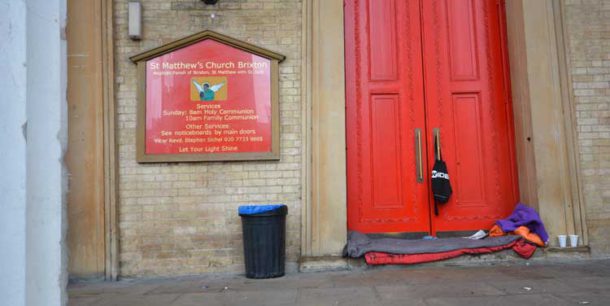
Lambeth Law Centre’s Public Interest Law Unit (PILU), based in Mowll Street off the Brixton Road, has succeeded in an important legal case to prevent rough sleepers from Europe being deported unlawfully by the Home Office.
Since early 2016, before the EU referendum, the Home Office has been seeking out nationals of European Economic Area (EEA) countries who are sleeping rough and ruling that they are abusing European Union free movement rights.
The people affected, mainly from eastern Europe, have been detained and deported, whether or not they were working and/or had been granted permanent right of residence.
PILU, working with other organisations, this summer succeeded in an application for a judicial review of the Home Office’s actions that was based on three cases.
Now the High Court has ruled, after a three-day gearing at the end of November, that the Home Office has been acting unlawfully.
Mrs Justice Lang granted claims for judicial review in the cases of Gureckis, Perlinski & Cielecki v the Secretary of State for the Home Department.
She found for the claimants on all three grounds:
- That the policy was unlawful because rough sleeping was not capable of amounting to an “abuse of rights”;
- That the policy was discriminatory against EEA nationals, and
- That the Home Office was carrying out a policy of systematically verifying whether rough sleepers were abusing their treaty rights or not.
The Home Office, in collaboration with the homeless charities St Mungos and Thamesreach, carried out regular raids on locations where its officials believed that they would find EEA nationals who could be deported.
Experience shows that if we stand by and allow a marginalised group to be victimised, others can expect the same treatment later
PILU welcomed the judgment, saying: “We are delighted that the court has been willing to protect the rights of a vulnerable group of workers who have been stigmatised both by the authorities and by sections of the media.
“Experience shows that if we stand by and allow a marginalised group to be victimised, others can expect the same treatment later.
“Homelessness cannot humanely be dealt with by detaining or forcibly removing homeless people.
“This practice has been found unlawful and must immediately cease.”
PILU worked with a range of voluntary organisations to bring the challenge, including North East London Migrant Action.
As well as bringing the judicial review action, they helped a number of rough sleepers to get legal advice and to challenge successfully the treatment they had suffered.
The three claimants were represented by PILU/LLC solicitor Paul Heron and barristers including Marie Demetriou QC of Brick Court Chambers.
Lambeth Law Centre began as North Lambeth Law Centre in 1981 and changed its name after the closure of other law centres in the borough in 1997. It registered as a charity in 1998.
The centre, which employs 18 people, provides free advice, casework and representation in areas including housing, immigration, money, welfare rights, employment and discrimination.
The London Discrimination Unit, a centre project, runs specialist training in employment and discrimination issues.
Volunteer lawyers from the city staff the centre’s Monday evening and Wednesday morning advice sessions which are supervised by staff from the centre who act as a resource for the volunteers.
The centre also runs outreach sessions in collaboration with other agencies.
It is managed by a board of directors, annually elected from individuals and representatives of Lambeth organisations.



